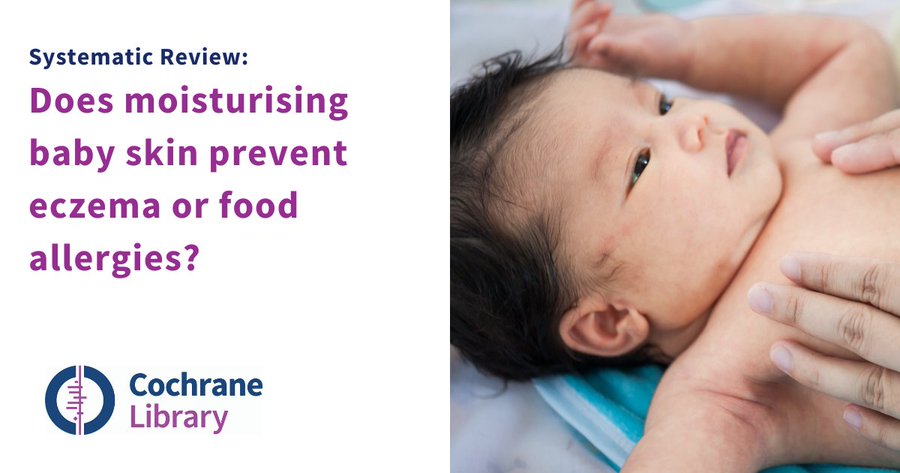
Skin care treatments in babies, such as using moisturisers on the skin during the first year of life, probably do not stop them from developing eczema, and probably increase the chance of skin infection.
The authors are uncertain how skin care treatments might affect the chances of developing a food allergy. We need evidence from well-conducted studies to determine effects of skin care on food allergies in babies.

What are allergies?
An immune response is how the body recognises and defends itself against substances that appear harmful. An allergy is a reaction of the body's immune system to a particular food or substance (an allergen) that is usually harmless. Different allergies affect different parts of the body, and their effects can be mild or serious.
Food allergies and eczema
Eczema is a common skin allergy that causes dry, itchy, cracked skin. Eczema is common in children, often developing before their first birthday. It is sometimes a long-lasting condition, but it may improve or clear as a child gets older.
Allergies to food can cause itching in the mouth, a raised itchy red rash, swelling of the face, stomach symptoms or difficulty breathing. They usually happen within 2 hours after a food is eaten.
People with food allergies often have other allergic conditions, such as asthma, hay fever, and eczema.
As review authors we wanted to learn how skin care affects the risk of a baby developing eczema or food allergies. Skin care treatments included:
- putting moisturisers on a baby's skin;
- bathing babies with water containing moisturisers or moisturising oils;
- advising parents to use less soap, or to bathe their child less often; and
- using water softeners.
We also wanted to know if these skin care treatments cause any unwanted effects.
What did we do?
The authors searched for studies of different types of skin care for healthy babies (aged up to one year) with no previous food allergy, eczema, or other skin condition.
Search date: we included evidence published up to 23 July 2020.
They were interested in studies that reported:
- how many children developed eczema, or food allergy, by age one to three years;
- how severe the eczema was (assessed by a researcher and by parents);
- how long it took for eczema to develop;
- parents' reports of immediate (under two hours) reactions to a food allergen;
- how many children developed sensitivity to a particular food allergen; and
- any unwanted effects.

The authors assessed the strengths and weaknesses of each study to determine how reliable the results might be. They then combined the results of all relevant studies and looked at overall effects.
Author Dr Maeve Kelleher, Honorary Clinical Senior Lecturer in Paediatric Allergy, Imperial College London explains, “Lots of babies get eczema, which can be very itchy and irritating for them. Babies with eczema are also more likely to have food allergy, hayfever or asthma. This project put together many studies conducted around the world, assessing if eczema could be prevented by putting moisturiser on babies skin from the first few days after they are born. Prior to this project, some studies have reported you could prevent eczema with daily application of a moisturiser. We looked at the results of over 3000 infants, from seven studies, and we can now say that daily moisturising of a babies skin cannot prevent a baby developing eczema and can even cause some increased skin infections.
There is strong link between eczema and food allergy, but unfortunately there were not enough babies in this study to tell us whether putting on a daily moisturisers changes the risk of food allergy."
The authors found 33 studies involving 25,827 babies. These studies took place in Europe, Australia, Japan, and the USA, most often at children's hospitals. Skin care was compared against no skin care or care as usual (standard care). Treatment and follow-up times ranged from 24 hours to two years. Many studies (13) tested the use of moisturisers; others mainly tested the use of bathing and cleansing products and how often they were used.
The authors then combined the results of 11 studies; eight included babies thought to have high risk of developing eczema or a food allergy.
The review authors are moderately confident in the results for developing eczema and the time needed to develop eczema. These results might change if more evidence becomes available. They are less confident about the results for food allergy or sensitivity, which are based on small numbers of studies with widely varied results. These results are likely to change when more evidence is available. Our confidence in our findings for skin infections is moderate but is low for stinging or allergic reactions and slipping.


